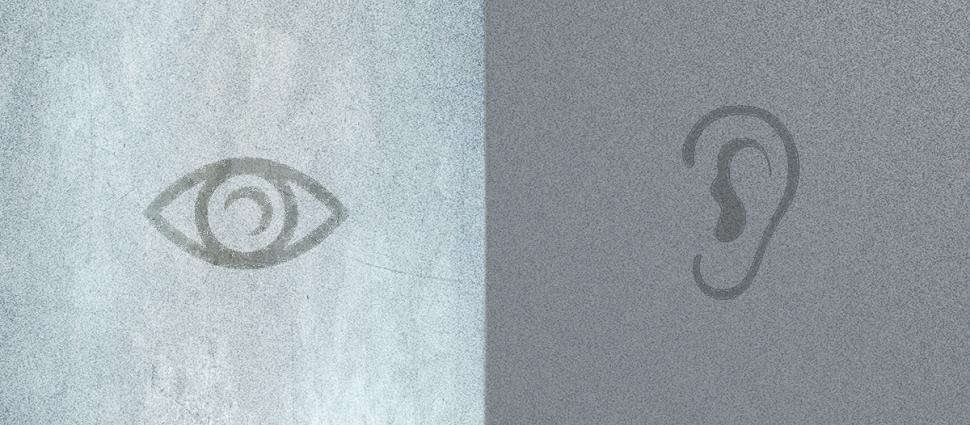Seeing, Hearing, Believing

Every single day, Christians are confronted with a barrage of competing messages. One cannot drive down the nterstate without being assaulted with numerous billboard messages–-political, commercial and even sexual. Visual messaging is the manner in which society has chiefly chosen to communicate. Perhaps one of the greatest confrontations we face, is when the Word of God and Providence appear to collide--when circumstances appear to contradict God’s promise, or what we see collides with what we believe. Such, can indeed, be a great trial of faith.
The unbelieving world is constantly telling us that “seeing is believing.” Sadly, believers often work according to that maxim. If we could just see evidence of God’s plan and goodness, or somehow be assured through circumstance, all would be well. If we could only know everything will work out (usually according to our definition) our faith would rest secure. Yet we must be clear, that mindset, is thoroughly unchristian and by no means the way God has determined we should walk. Consider the following example:
In John 20, Mary Magdalene approached the tomb of the Lord weeping with great sorrow (Jn. 20:11,13,15). She assumed (15) that the Lord’s body had been stolen and hidden, and with loving devotion asked the one whom she supposed to be the gardener, where he was laid. She was actually looking at her Lord but didn't have the eyes to see it. She saw with the eyes of flesh but still did not recognize him.
What had happened? Because he had cured her of demon possession, Mary loved her Lord with great zeal. She was, no doubt, devasted by the circumstances surrounding his death. She stayed at the foot of the cross, and then came to minister to her Lord in his supposed burial. She had not comprehended the teaching of Christ, that he must suffer, die, be buried and be raised from the dead. None of his disciples had truly comprehended this fact The circumstances before them overcame their earlier faith. They could not comprehend a resurrection – the supernatural and true explanation for the empty tomb; rather, they settled for a natural explanation – namely, that his body had been stolen. Circumstance over-ruled the Word of Christ.
The icing on the cake, and proof that seeing is not believing is that Mary did not recognize Christ by sight when he appeared before her, supposing him to be the gardener. She saw him but was not believing him. Conversely, when Jesus called her name, “Mary,” her “eyes” were opened and she believed. It was not sight that convinced her, it was the spoken word of Christ.
This point is vitally important for the Christian to grasp. God’s Word to us is sure and certain, regardless of circumstance. Sorrow, sickness, pain, poverty, bereavement, unemployment, divorce, tragedy can never undo the Word of God. These trials, are in fact, God’s providential care and ordering of all things or his glory and our blessing. Providence and Promise, simply cannot collide.
More importantly, God has not designed faith to be based on sight. That’s why it is called faith – because it accepts, believes and trusts things that are unseen, not seen (Heb. 11:1). We are all comfronted with the question, "Will we believe and trust God in spite, or we might add, even through such trials?" Here are several pointers to help us in this matter:
First, do we believe by sight or by hearing? The Apostle tells us faith comes by hearing not by sight (Rom. 10:14). We ought not, then, strive to supplement our faith with things that we see, rather than with the things we hear in God's word.
Second, this rule (i.e. "we walk by faith, not by sight") guards us against two extremes: 1) Doubting God’s word in times of hardship and 2) forgetting God in times of blessing. Prov 30:8-9 speaks to this “…give me neither poverty nor riches… lest I be full and deny you…or lest I be poor and steal”. Living by faith ought always to remind us that in blessing we are undeserving and in hardship we are preserved by God’s grace.
Third, faith accepts both promise and providence as working in harmony, not competition. Job initially answered correctly “Shall we receive good from God, and shall we not receive evil?” (Job 2:10). Providence as much as promise belongs to God and can no more contradict each other than can Father and Son.
Finally, and this is of great value to the Christian. We are not given to see much of what we hold by faith. That does not make our faith any weaker than those who saw Christ’s resurrection. Indeed, our Lord said to Thomas, “blessed are those who have not seen yet have believed.” (John 20:29).
Indeed, seeing is not believing.





